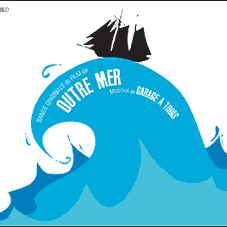
File this under: Great Publicity Stunts.
So Monday night I was reckless and bought a CD. (Yes, I know that’s, like, so 90s, but I don’t have an ipod, nor even a computer to download stuff on. I’m just a mermaid, what do you want from me?) Being nostalgic, I couldn’t help but seize upon “Outre Mer” by Garage a Trois. A sucker for anything oceanic, I was reeled in (ha, ha) by the title and accompanying cover art of waves and an old-timey boat. I gave it a whirl at one of those listening stations where you can help but wonder how many people have worn those headphones before you.
The tracks are a tight knit kaleidoscope of percussion and sax threaded with vibes and bass guitar that often echoes the vibes. 70s in feeling, speaking funk but referencing 60s spy movie music, now and again a tabla enters the conversation. The sax moves cheerfully between subdued crooning and deep experimental jazz squawking, but the vibes were the real selling point for me. I mean, I really love the vibraphone, so bring on the Lionel Hampton. I even love anything vibes-like: gamelon, steel pan, glockenspiel. So, sold. It's perfect party music and has held up under repeat listening.
"Outre Mer" claims to be the soundtrack of a French film called “Outre Mer”, but doesn’t have a real soundtrack feeling. That is: there are no down-tempo tracks. “Outre Mer” coasts along at an even keel without any significant shifts in mood. Also: there are no accompanying photos from the film with the liner notes. Fishy, no? The protagonist, a 19th Century little person named Etienne de Nerval, seems like a direct reference to 19th Century French poet Gerard de Nerval, famous for hash smoking and a fondness for lobsters. Hmmm.
The plot, according to the liner notes, involves the invention of a cinema-like device that projects Etienne’s thoughts onto a screen by embedding needles in his skull. There was some kinda problem with distribution. Or the film hasn't been finished yet. Or it is somehow not available. My credulity was strained. But I wasn’t laughing until I really thought about the director’s name: Klaus Tontine.
A tontine, for those of you not up on the history of banking and life insurance, is an investment strategy from the 17th Century. Investors buy subscriptions to a tontine that entitles them to annual interest payments from the pooled amount. As other investors die, the number of people dividing the annuity becomes smaller and smaller, and the amounts larger and larger. Fraud and corruption, along with the incentive to murder other investors, has made them illegal in the US and UK.
Are you surprised that google searches for the film and the director turned up nothing besides the copy on Garage a Trois’ website?
A faux soundtrack! I’d love to see this become a music genre unto itself.


0 Comments:
Post a Comment
<< Home